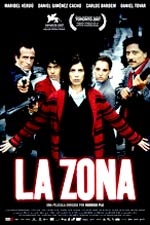CRÍTICA

-

La zona, vecinos invasores en el cine mexicanoPor Diego Batlle
La zona, ópera prima del director uruguayo radicado en México Rodrigo Plá, tiene una solidez en su puesta en escena, una narración vigorosa y un acabado técnico que hablan a las claras de un director con talento y con futuro (a mí, de todas maneras, no me convenció demasiado su segundo filme, Desierto adentro, que compitió en la sección oficial del Festival de Mar del Plata 2008).
Premiado en decenas de festivales (Toronto, Venecia, Montreal, San Francisco, Miami, Friburgo y un largo etcétera), este aclamado debut me resultó una muestra de gran profesionalismo técnico, pero... El problema empieza cuando se analiza el contenido, y ahí la película me resultó demasiado maniquea y hasta oportunista.
La historia se concentra en un barrio privado de la clase alta del DF rodeado por villas miserias. Esta especie de fortaleza custodiada por guardias armados y cámaras de seguridad en cada esquina es violada por tres delincuentes que ingresan a robar: dos de ellos mueren en el intento y el tercero se esconde en el sótano de una de las casas, desde donde entablará una relación con el hijo de uno de los líderes del exclusivo conglomerado.
La película —que tiene algunos elementos que la vinculan con Vecinos en la mira, reciente thriller con Samuel L. Jackson— describe con bastante poca sutileza (es decir, subrayando demasiado) las diferencias de clase y la guerra de ricos contra pobres, el creciente peligro de las armas en manos privadas, el racismo, la estigmatización de los marginales, la corrupción policial, la cultura del ojo por ojo y la justicia por mano propia... y la enumeración podría seguir.
Tratado moral sobre la venganza, la culpa y las miserias humanas (hay delaciones, cacerías humanas y hasta linchamientos), La zona —título que alude al barrio privado en cuestión— apela a un realismo "sucio" (mucho vértigo, cámara en mano) que logra sostener la tensión y el suspenso. El problema, quedó dicho, es todo lo que está metido dentro de ese vistoso envoltorio.
 La zona, invading neighbors in the Mexican movies
La zona, invading neighbors in the Mexican movies
By Diego Batlle
La zona, first work of the Uruguayan director living in Mexico Rodrigo Plá, has a solid Mise-en-scène, a vigorous narration and a technical realization that clearly reveal a director with talent and future (even when for me it was not totally convincing his second film, Desierto dentro which was part of the official section of the 2008 Mar del Plata Film Festival).
Awarded in dozens of film festivals (Toronto, Venice, Montreal, San Francisco, Miami, Freiburg and many others), this acclaimed film debut seems to me an example of great technical professionalism, but... the problem begins when the content is analyzed, and in this sense the film seems to me too much Manichaean and even opportunistic.
The story focuses on a private neighborhood of the upper class of Mexico City surrounded by slums. This kind of fortress guarded by armed guards and surveillance cameras at each corner is disrupted by three criminals that broke into to burglarize: two of them die in the intent and the third hide in the basement of one of the houses, from where he will forge a relationship with the son of one of the leaders of the exclusive housing conglomerate.
The film - that has some elements that relate it to the Lakeview Terrace, a recent thriller with L. Jackson - describes with not so much subtlety (that is to say, too much obviousness) the class differences and the war of rich against poor, the growing danger of weapons in private hands, the racism, and the damnation of marginal people, the police corruption, the culture of an eye for an eye and a tooth for a tooth, the justice take for individual hands... and the enumeration of ills could continue.
Moral essay about vengeance, guiltiness and human miseries (there are denunciations, human hunts and even lynching), La zona - title that refers to the private neighborhood’s name in the film - appeals to a "dirty" realism (a lot of vertigo, hand-held camera) that manage to sustain tension and suspense. The problem is, all what is contained within this showy cinematic wrapping.
(Fuente: Otroscine.com)
Copyright © 2026 Fundación del Nuevo Cine Latinoamericano. Todos los derechos reservados.
©Bootstrap, Copyright 2013 Twitter, Inc under the
Apache 2.0 license.

